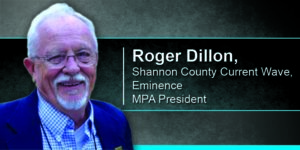
It’s been almost 50 years since the Freedom of Information Act was passed by Congress and Missouri followed suit with our Sunshine Law (RSMO Chapter 610), putting it into the state Constitution and making us one of the earliest advocates of the open records act.
The law clearly states that meetings, records, votes, actions, and deliberations of public governmental bodies are to be open to the public.
Records are defined by Missouri law as “any record, whether written or electronically stored, retained by or of any public governmental body including any report, survey, memorandum, or other professional service paid for in whole or in part by public funds, including records created or maintained by private contractors under an agreement with a public governmental body or on behalf of a public governmental body.”
While we, as journalists, may be the most frequent users of the Sunshine Law, anyone can request documents and a statement of purpose is not required, though I suspect it is not rare that a public official asks for one.
Though we may tend to think of it as “our” law, the Missouri Press Association has for over four decades campaigned tirelessly to inform our readers and the public in general that the law is for everyone.
And a benefit to all Missouri citizens.
When asked what threats or challenges the Sunshine Law faces, MPA’s legal guru Jean Maneke said the No. 1 obstacle to the public is cost.
“When a requester cannot specifically identify what record is sought, it hinders fast location of that record, which drives up the “search” portion of the cost,” Jean stated, adding that today’s electronic databases have helped lower those costs. “Copying thousands of pages of records can now sometimes be done in the push of a button, saving data onto an external drive.”
“The biggest threat to Sunshine Law rights is the push by public bodies to refuse to disclose public information they hold,” Jean wrote. “Access to information is beneficial to the public, but the public has to overcome a natural ‘secrecy’ mentality — that what people don’t’ know can’t hurt them. It can hurt them. Information is the way society grows and solves problems. Secrecy only hurts that process.”
Unfortunately, it appears that the biggest threats to Sunshine Law rights today just might be certain Missouri legislators, such as Rep. Bruce DeGroot, Attorney General Eric Schmitt and Governor Mike Parson.
DeGroot’s proposed HB 2049 would narrow the focus or put limits on Missouri’s Sunshine Law by creating new categories of public records, called “transitory records” or “draft records,” that would be exempt.
The bill also appears to be an attempt to undo a recent Missouri Supreme Court decision that the public should not be charged unreasonably large fees for the process of sorting and retrieving public records. The bill would also narrow the definition of “public business” substantially, making some existing public meetings no longer public, including meetings of subcommittees.
As noted in a recent Op-Ed piece by national columnist Thomas L. Knapp, which ran under the headline: ‘Missouri Governor Mike Parson Tries to Stick it Where the Sun Don’t Shine,’ Parson tried to charge Elad Gross, a candidate for state attorney general $3,618 for documents Gross requested under the state’s Sunshine Law, claiming more than 90 hours of required “research and processing” at $40 per hour.
According to Knapp, the “processing” involved having attorneys redact information from requested documents, and “Now Parson’s asking the state legislature to amend the Sunshine Law so that he can keep more government documents secret and charge more for handing over such information.
“In the meantime, the state’s attorney general, Eric Schmitt, claimed that he couldn’t investigate alleged violations of the Sunshine Law by the governor’s office because that office (rather than, say, the people of Missouri) is his ‘client,’” Knapp noted. “Government transparency should be the rule, not the expensive exception.”
The Missouri Press Association’s position has long been that the Sunshine Law is critical to protecting the state’s citizens and promoting government transparency.
There are a myriad of important challenges and problems that the Missouri 2022 legislative session should be addressing. Changing, diluting and restricting the Sunshine Law should not be among them.


